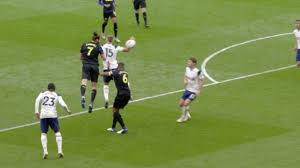By Andrew Warshaw
September 28 – It’s got to go. It’s killing the game. It’s an absolute joke. We’ve lost the plot.
These were just a smattering a comments by seasoned coaches, pundits and commentators at the weekend that poured scorn and ridicule on the revised handball law that is ripping fair play and common sense out of football and wrecking the spirit of the game.
Rarely, if ever, has the expression “the law is an ass” been so apt when it comes to applying to the world’s most popular sport.
Not one, not two but three Premier League fixtures at the weekend were settled by the interpretation of a law which, as one commentator perfectly put it, “punishes the unavoidable”.
Much has been made in recent months, and rightly so, of the extent to which VAR is ruining the game as a spectacle when penalising players for the most miniscule of offside violations.
Yet what we are witnessing with handball – which basically removes intent and scraps accidental contact – is potentially far more damaging.
Why? Because it encourages opportunistic gamesmanship by the attacking team verging, some might go so far as to say, on deliberate cheating.
Under the current law, handball has to be given if a player makes his body bigger with his arm and it is automatically an offence if the arm is above shoulder height.
The change was meant to bring about greater clarity following the debacle over what constituted deliberate handball. Instead it is flawed in the extreme and has been roundly condemned for making matters far worse.
What happened at the Tottenham Hotspur-Newcastle fixture on Sunday is a case in point. In added time, after being penned back for the entire 90 minutes, Newcastle launched an unwarranted freekick towards the head of substitute Andy Carroll.
Newcastle got lucky the ball when Spurs defender Eric Dier, who actually had his back to the ball, was penalised after it rebounded against his arm. He couldn’t get out the way yet ludicrously a penalty was awarded and Newcastle grabbed a point having not had a single shot on target.
Dier, having used his arms to jump, was adjudged to have made his body “unnaturally bigger”. Which begs the question, how on earth can any defender safely defend?
Despite profiting from the incident, Newcastle manager Steve Bruce said the law was counter-productive.
“The handball has been around for 100 years. If it is deliberate, no problem, but it has to be clear and obvious,” said Bruce. “We have lost the plot with it and it loses the spectacle. We seem to have these phases where we take everything literally in the Premier League and maybe we have to say no to it.”
Bruce wasn’t alone. Twenty-four hours earlier, former England manager Roy Hodgson, the most mild-mannered of men who rarely gets involved in controversy, could not contain his anger after his Crystal Palace team suffered a similar fate again Everton.
Palace’s Joel Ward was penalised in the dying moments after Everton’s Lucas Digne headed into the defender’s hand from close range to take all three points for the visitors.
“It’s completely unacceptable and is destroying my enjoyment of the game of football,” fumed Hodgson. “I can’t understand how everyone in the game – the Premier League, referees, managers and coaches – have allowed this rule to come into operation.”
Hodgson, whose views are surely shared by every sensible fan, argued there was a clear distinction between intentional and accidental.
“These days we’re in a situation where we can’t understand what is a handball and what isn’t. I don’t want to profit form it or lose to it, there’s no doubt it’s killing the game.
“I will predict what will happen: people will be flicking balls on to people’s hands and screaming for handball. If you think that’s going to make the game better, then good luck to you.”
In a third incident Brighton were beaten by Manchester United in the 10th minute of stoppage time when the flight of the ball was altered by the flailing arm of a Brighton player and a penalty awarded, even though the referee had already blow for full time.
Although this third incident was less debatable than the other two, the worry, as Hodgson implied, is that coaches and players will be encouraged to use the tactic of launching hopeful balls forward to try and gain a handball decision courtesy of some hapless defender.
Yet despite the clamour for change, we may have to wait until March, when IFAB’s next full meeting takes place, for any decision to scrap the current wording.
Until then, unless the law is simply ignored by referees, points will continue to be disgracefully won and unfairly lost and teams knocked out of cup competitions through no fault of their own.
IFAB will doubtless argue that they are damned if they do and damned if they don’t. But there are ways of making laws clearer and fairer – and this, deplorably, isn’t one of them.
Contact the writer of this story at moc.l1751837215labto1751837215ofdlr1751837215owedi1751837215sni@w1751837215ahsra1751837215w.wer1751837215dna1751837215

